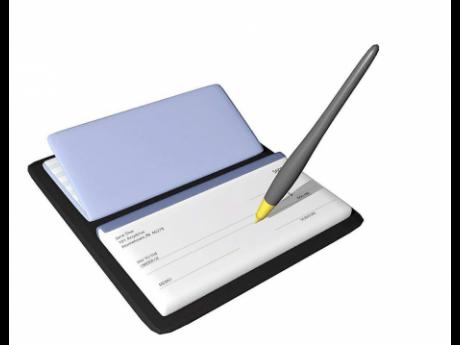Cheques fading as spending recovers
People are still using cheques but since the onset of the COVID-19 pandemic usage has dropped by one-third, according to data from the Bank of Jamaica, BOJ.
In an era of physical distancing the use of cheques seems less efficacious. Just over $100 billion worth of cheques were processed in the system in July, down from $160 billion in July 2019.
At the same time, retail point-of-sale activity has regained ground and actually surpassed year-earlier levels, signalling that retail consumers are spending again, but not with cheques.
Trend data in the BOJ Payment System Data Bulletin showed that cheque transactions had been on the rise over many years, but started fading in March, the same month in which the COVID-19 coronavirus was detected in Jamaica.
“Cheques are accepted from customers who are pre-approved. We have seen a decline of approximately 10 to 15 per cent in cheque usage among that group, as customers seem to be opting for other methods of payment,” said GraceKennedy CEO Don Wehby regarding transactions at the conglomerate’s nationwide chain of supermarkets, Hi-Lo Food Stores.
He added that the Hi-Lo has seen an increase in credit card transactions since the outbreak of the virus.
The drop in cheque usage at first shadowed the wider fallout in total retail transactions, which includes other payment methods such as cash, debit and credit cards. The data, however, indicates some recovery in retail activity in July, even as cheque payments wane.
“We still pay a lot of suppliers by cheque, but during COVID-19 we made bigger purchases so less cheques were used,” said Anne Chang CEO of Fontana Limited, Jamaica’s largest pharmacy chain. “But I wouldn’t say it’s a significant drop,” she added.
Fontana uses cheques for business-to-business transactions, but stopped accepting cheques from most of its customers as payment for purchases years earlier.
Other companies have done the same, and while companies like Fontana describe the policy shift as small changes, the combined result has been a significant shift away from cheque payments.
Scotia Group Jamaica, the second largest commercial bank, has previously reported that it has seen an acceleration in the use of its digital channels by customers, and also the reduction in cheque usage since COVID-19. Like Scotiabank, other commercial banks have been accelerating and/or promoting their digital channels as substitutes for in-branch services, and it’s likely the others are seeing similar outcomes.
Between April and June, total cheque transactions fell by a third to $271 billion from $431 billion in the corresponding period in 2019, and $425 billion in 2017. The volume of transactions over April-June was also down by a quarter, year on year, from one million to 740,000 transactions.
Total retail payments across the economy in July stood at $207 billion, a slight dip from $209 billion in 2019.
The value of transactions between April and June was $582 billion, down from $586 billion a year earlier. The biggest dip came in the month of April, which recorded $180 billion of transactions. That’s down $17 billion from $197 billion in April 2019.
Overall retail activity began recovering in July, signalling increased spending. The total value of point-of-sale transactions, for example, totalled $61 billion, up from $60 billion the year before, making July the first month of higher POS transactions since the onset of the coronavirus and the restrictions on public interactions and gatherings.

